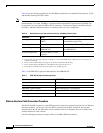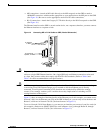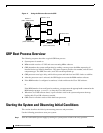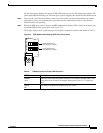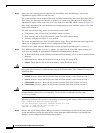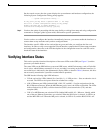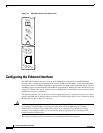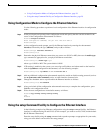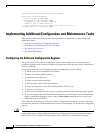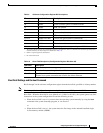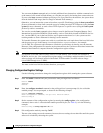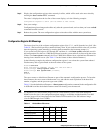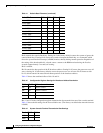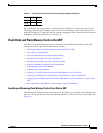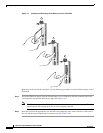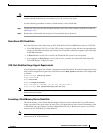
30
Implementing Additional Configuration and Maintenance Tasks
78-4339-09
Implementing Additional Configuration and Maintenance Tasks
(Additional displayed text omitted from this example.)
Configuring interface Ethernet0:
Is this interface in use?: yes
Configure IP on this interface?: yes
IP address for this interface: 3.3.1.1
Number of bits in subnet field: 8
Class A network is 3.0.0.0, 8 subnet bits; mask is 255.255.0.0
Configure CLNS on this interface?: yes
Implementing Additional Configuration and Maintenance Tasks
This section contains information on the following additional configuration, troubleshooting, and
maintenance tasks:
• Configuring the Software Configuration Register
• Flash Disks and Flash Memory Cards in the GRP
• Recovering Lost Password
• Upgrading GRP Memory
Configuring the Software Configuration Register
The system uses a 16-bit software configuration register, which allows you to set specific system
parameters. Settings for the software configuration register are written into non-volatile random access
memory (NVRAM).
Following are some reasons for changing the software configuration register settings:
• To select a boot source and default boot filename
• To enable or disable the Break function
• To control broadcast addresses
• To set the console terminal baud rate
• To load operating software from Flash memory
• To enable booting from a Trivial File Transfer Protocol (TFTP) server
• To recover a lost password
• To allow you to manually boot the system using the b command at the bootstrap program prompt
• To force an automatic boot from the system bootstrap software (boot image) or from a default system
image in onboard Flash memory, and to read any boot system commands that are stored in the
configuration file in NVRAM
Table 9 provides descriptions of each of the software configuration memory bits, and Table 10 defines
the boot field, specified as a binary number that consists of bits 0 through 3 of the software configuration
register.
Caution To avoid confusion and possibly halting the Cisco 12000 Series Router, remember that valid
configuration register settings might be combinations of settings and not just the individual settings
listed in Table 9. For example, the factory default value of 0x2102 is a combination of settings.



